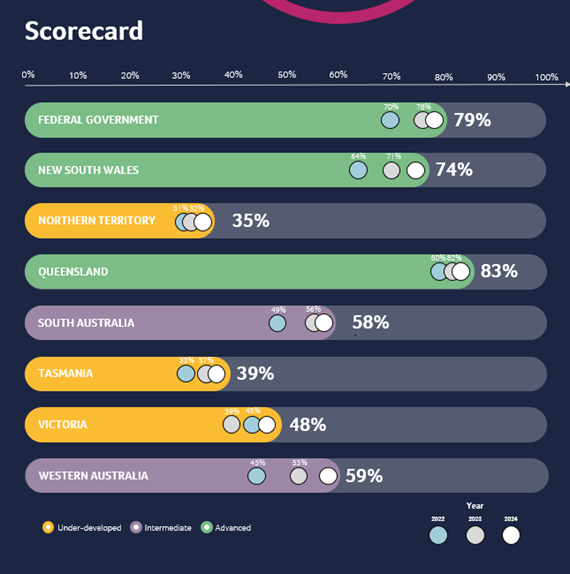Carbon Farming Scorecard shows positive steps for transparency, integrity and governance – highlights opportunity for national integration and scale
The 3rdannual Carbon Farming Scorecard evaluates progress of Australia’s states, territories and the federal government in supporting the rapidly evolving carbon farming industry. It is released for the opening of the 8th Carbon Farming Industry Forum in Cairns, Queensland.
The carbon farming industry has made important step-changes in the last 12 months as new policies, programs and review recommendations continue to be implemented across key jurisdictions, according to the Carbon Market Institute’s (CMI) latest Carbon Farming Scorecard Report.
“We’ve seen another year of considerable progress at both a state and federal level, led by the federal government’s reform agenda and supported by growth across key states and territories,” said John Connor, CMI CEO.
Connor said that alongside the Australian Government, most states and territories have made incremental progress, however the report reflected a need for greater alignment and clearer articulation of the contribution of carbon farming and markets to achieving ambitious national and jurisdictional decarbonisation and nature positive outcomes.
Prepared in partnership with KPMG, the third annual edition of the report found that Queensland (83%), the federal government (79%) and New South Wales (74%) remained the most advanced jurisdictions in the level and nature of support for carbon farming and its role in recognising and delivering Indigenous, social, environmental and economic co-benefits for regional communities.
Western Australia (59%) saw the biggest jump since the release of the last scorecard. Namely with the Carbon and Land Restoration Funding Program and the Carbon Farmers Voucher Program, WA moved 6% higher to sit just above South Australia (58%) in the intermediate category. Victoria (48%), Tasmania (38%) and the Northern Territory (35%) all made notable progress, however remained under-developed in their support for carbon farming policy and programs at this stage.
At a national level, the government was recognised for its work in continuing to implement the first phase of ACCU Review recommendations, focused on underpinning market transparency and integrity. However, uncertainties remain among market participants due to the gap between the sunsetting of two land-based methods and the introduction of new or revised methods.
Additional budget resourcing of $48 million to implement ACCU reforms provides the potential to progress new high integrity methods and complete other integrity and legislative reforms.
“Several jurisdictions have set ambitious bipartisan 2035 targets, and the government is developing a comprehensive sectoral approach to achieving net zero ambitions. To continue to build investor and community confidence, these must now be accompanied by clearer articulation of the role of carbon farming in supporting decarbonisation and reversing deforestation, ecological restoration and carbon removal. This includes greater clarity on how the government will transition its own purchasing role in the carbon market, as we shift to private sector led demand,” said Connor.
Barry Sterland, KPMG National Lead for Climate Policy Advisory, said: “Over the three years of the Carbon Farming Scorecard we have seen real progress across all jurisdictions. Going forward, further improvements can be made by adopting successful approaches more widely, and knitting these together with stronger national coordination. An integrated approach will support further positive achievements for the future.”
Connor concluded: “The key challenge for the next 12 months is to ensure new, high integrity methods are finalised to provide sufficient levels of supply. Without this, there is a real risk that we underplay the important role that land-based sequestration can contribute to Australia’s decarbonisation and nature positive goals,” he said.
A snapshot of 2024 scores can be found below:

*Although included in the inaugural Scorecard, the ACT has not been scored this year due to its natural geography having a limited capacity for land-based carbon storage.
The full 2024 Carbon Farming Scorecard Report is available here.
Further information on the 8th Carbon Farming Industry Forum can be viewed here.
About the Carbon Market Institute
The Carbon Market Institute (CMI) is a member-based institute accelerating the transition towards a negative emissions, nature positive world. It champions best practice in carbon markets and climate policy, and its around 150 members include primary producers, carbon project developers, Indigenous organisations, legal, technology and advisory services, insurers, banks, investors, corporate entities and emission intensive industries. The positions put forward constitute CMI’s independent view and do not purport to represent any CMI individual, member company, or industry sector.
For further information, contact Thomas Hann on 0408 880 536 or thomas.hann@carbonmarketinstitute.org
About the Carbon Farming Scorecard Report
CMI’s Carbon Farming Scorecard presents a snapshot of how Australia’s states, territories and the federal government are supporting carbon farming and its associated benefits. It evaluates their progress on fostering growth and ambition across the domestic carbon farming industry, whilst implementing consistent and predictable policies to ensure transparency and integrity, and facilitate clear demand signals that provide supplier confidence and encourage private investment.
Developed with KPMG’s support as research partner, the Scorecard comprises 12 criteria against which Australia’s federal and state and territory governments have been assessed, and are grouped under the Carbon Farming Industry Roadmap’s four critical pillars for industry development: “Optimising Policy Frameworks and Market Design; Unlocking Finance and Investment; Quantifying Co-benefits and Creating New Markets, and; Communicating Benefits and Building Capacity”.



